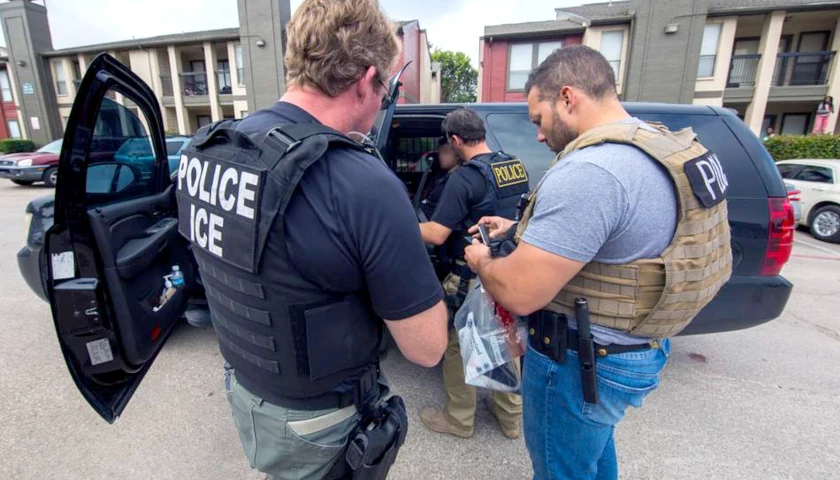On Wednesday’s Tennessee Star Report with Steve Gill and Michael Patrick Leahy – broadcast on Nashville’s Talk Radio 98.3 and 1510 WLAC weekdays from 5:00 am to 8:00 am – Gill and Leahy talked with State Rep. Glen Casada (R-Franklin), the incoming Speaker of the Tennessee House of Representatives about the challenges the Tennessee General Assembly will face in its new session, which began formerly later in the day.
Gill and Leahy discussed a number of topics with Casads, including Shelby County’s defiance of state statutes regarding illegal immigration and sanctuary cities, the new incoming freshman legislators and the challenges they face, school choice, and criminal justice reform.
At the end of the segment, Gill and Casada touched upon what Bill Lee’s lack of conservative cabinet picks mean for the Tennessee legislation.
Gill: The incoming house speaker who will soon move to that position, current state representative and soon to be house speaker Glen Casada is on the line with us this morning.
Casada: Good morning Steve, how are you?
Gill: Now when do you actually take over as house speaker?
Casada: I am sworn in at approximately noon, Tuesday, January the 8th.
Gill: So you’ve got about one more week to figure out how you’re going to herd cats and (Laughter) and bring some order to chaos with a bunch of new members of the state legislature. When will you start announcing who the committee chairmen and chairmen, chairwomen are going to be? Just kind of walk us through the process.
Casada: Yes, well we’ve been busy for weeks putting this together, both the mechanics with the clerks office, and working on committee, committee structures, committee and then we just started working on the make up top members. So we’ll announce that Thursday morning, the 10th of January.
Gill: And in the meantime you’re deciding whether you’re going to add new committees, break committees up into seperate committees, combine them. So, I mean, there’s really a complete structural overhaul.
Casada: It really is. I think, and if people would study state politics, we haven’t had this much change Steve in state politics since the Civil War. A third new legislators, a new Governor, it’s significant what we’re seeing in the leadership we’re seeing in the state of Tennessee.
Gill: How will that change things? Because I mean you’ve been the caucus chair, the whip, you’ve had a variety of positions, now you’re going to be the speaker. You’ve been there for awhile. How do you get these new members up and running because I mean literally ya’ll going to be drinking out of a fire hydrant as soon as they get there. I’ve told folks in the past, if you want to start communicating to the legislator about various issues you better start about two or three months ago. Because once they get into session it’s coming at them from all angles. How do you prepare the new freshman members of the legislator for the onslaught to come?
Casada asked that Gill take a look at the new legislators who he described as “successful in life.” He believes that a successful person makes for a successful legislator and assured that they’ll hit the ground running from day one. Gill went on to question Casada about Memphis’s recent stance on illegal immigration and sanctuary cities. Casada responded by stating that the mayor of Memphis has reached out to him several weeks ago and Casada was hoping that the statement came from a low level bureaucrat and not directly from the Mayor. He urged, that due to that statement of failure to comply would be something that needs immediate attention and requires a serious conversation.
Gill: It’s bad enough that the illegals are snubbing their nose at the law. Now you’ve got city officials that are apparently doing the same thing.
Casada: Yeah.
Leahy: This is Michael Patrick Leahy soon-to-be Speaker Casada. First congratulations on that. Just as a point of clarification in our story today – you’ll note that that statement of failure to comply with the states laws was made by Shelby County Sheriff spokesman, Anthony Buckner in a statement to the Tennessee Star it’s in our story today.
Casada: Hmmm. Yeah, again it’s a disturbing statement that the Sheriff is directed to the voters of Shelby county and find it hard to believe that people of Shelby county would agree with the Sheriff’s office. It’s going to require a serious conversation on what is going on down there.
Gill: A lot of other issues are going to come up very quickly. One of the ones that I’ve been kind of caught by surprise is that apparently legalized sports betting is going to be on the agenda whether you don’t want it there or not. One of the legislators is pushing forward with legalized sport betting. Do you have any sense of a, whether this has a shot of becoming law, and b, what you kind of believe about this issue.
Casada: Let’s say real quick, sports betting is not the Tennessee, I know that it’s going to be the push, “Hey it’s more revenue for the state of Tennessee.” I have found that gambling can lead to more trouble with the other peripheral problems it brings with it then the actual revenue it will bring into the state. Does it have a possibility of passing? I’ve got my eyebrows raised, let me just say that. (Inaudible talk)
Gill: You know, it’s interesting it does take money away. There are certain number of gambling dollars and I know the folks in Tunica may not be enthusiastic about folks in Tennessee being able to gamble without going there or up to Evansville. You’ve got a state lottery. If I’ve got ten dollars that I’m going to go bet, whether its on lottery tickets or in sport betting, there’s only a limited amount of those dollars that’s just going to move where they’re placed, it seems.
Casada: Steve I couldn’t agree more. Because your budget, my budget, we spend x amount on housing, x amount on food, and we have just a small amount for recreation. So do we spend the recreation at the theatre downtown, or do we spend it on sports betting. So, exactly, that’s what’s there.
Leahy asked Casada about an important policy question regarding school choice that Bill Lee endorsed in July but now seems to be missing from his priorities. Leahy asked Casada whether he will support such a bill and whether or not he believe it could pass.
Casada enthusiastically answered that he would indeed vote for the bill if it gets to the house floor. He talked about a conversation he had with another legislator and how he felt about it and his confidence that this legislator could push it thorough. He urged that the real issue was whether it would pass or not. “It’s going to be a battle, it’s going to be a close vote,” stated Casada. Gill noted the dilemma of rural families who don’t’ have access to private schooling accessibility and that the numbers just don’t work to make it work.
Casada: That’s why vouchers has failed in the past Steve. I support vouchers too by the way. But they have failed and that is why. The rural derogation doesn’t have a buy in on vouchers. And so, I support vouchers. Maybe we can figure out a way to make that work as well. But that’s been a problem.
Gill: Are there any other key issues that you think are going to come up in this legislative session that will get early attention and maybe spark some controversy?
Casada: You know the early attention I think will be looking forward to what the Governor’s going to roll out on equal instances on vocational education as well as academic. And I’m really interested in how he’s going to address recidivism. Steve we’ve got to many people who serve their time, come back into society, and then re-commit a crime and go back to jail. We’ve got to incorporate those people back into our economy. We want them working, not in prison. Those are two things I think will take early attention and the legislators ready to get behind the Governor and support whatever he’s for on both those areas.
Gill: Will that criminal justice reform include restoring voting rights to felons?
Casada: You know, I don’t see the Governor taking that up. I don’t. I think we need to focus on the problem and the problem is too many individuals go back to jail. So how do we incorporate them back into society. That’s what we need to focus on.
Gill: Well and when you get back into the education piece which you mentioned as well, early education. I mean, a kid that doesn’t read by third grade is more likely to end up in our prison system later. So you really can’t separate the vocational training, the recidivism numbers, and making sure that basic reading is achieved in third and fourth grade.
Casada: And we put a good emphasis on academic education, going to college but Steve a lot of the young people, that’s a path that they’re interested in so we lose them. (Chuckles) The education.
Gill: When welders are starting at about ninety to a hundred thousand dollars a year and folks graduating with you know early renaissance painting studies or you know working at a fast food restaurant that maybe the economics ought to play in as well.
The men concluded the conversation with Gill asking Casada about what he thought regarding the lack of conservatives in the newly elected Governors cabinet. Casada responded that it was the legislator that was the most important which he stressed is conservative and that they are the one’s that pass the laws and fund or not fund.
He stated that the Governor is the one that drives the train and added that he believes Bill Lee to be a good Christian and business man assuring he was confident that it was going to be a good team for Tennessee.
Listen to the full segment:
– – –
Tune in weekdays from 5:00 – 8:00 am to the Tennessee Star Report with Steve Gill and Michael Patrick Leahy on Talk Radio 98.3 FM WLAC 1510. Listen online at iHeart Radio.
Photo “Glen Casada” by Glen Casada.






Casado said, “….he believes Bill Lee to be a good Christian and business man assuring he was confident that it was going to be a good team for Tennessee.”
That being so, he will keep his word, specifically his “Ten for Tenn” conservative agenda. As Jesus said, “let your yes, be yes and your no, be no.” And most importantly, the Governor-elect and all Legislstors will do the same and uphold their oaths to the State Constitution.